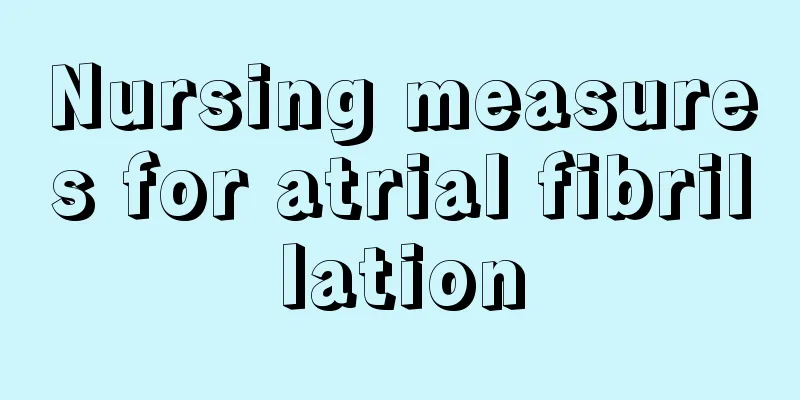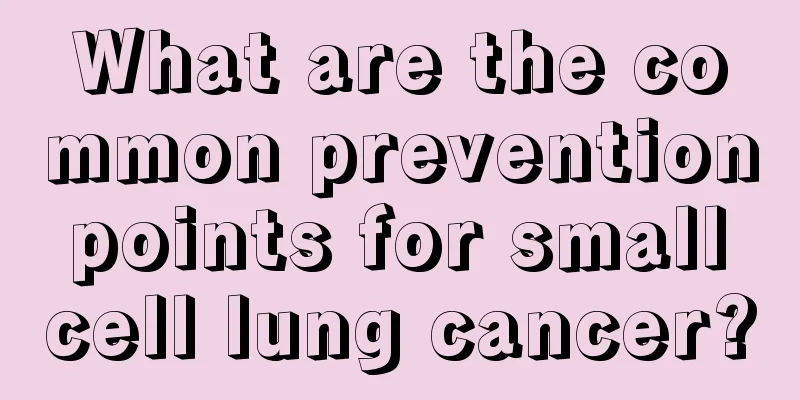Nursing measures for atrial fibrillation

|
Atrial fibrillation mainly refers to a type of atrial fibrillation caused by abnormal heart rhythm. Therefore, when the patient shows symptoms of atrial fibrillation, he or she often feels palpitations, chest tightness, and difficulty breathing. Severe atrial fibrillation requires surgery to treat, and after atrial fibrillation surgery, the patient's family should also pay attention to caring for the patient, which can help the recovery of atrial fibrillation. Therefore, the patient's family must understand the relevant care measures for atrial fibrillation. Atrial fibrillation care is an integral part of the rehabilitation process and requires careful treatment and attention to certain matters to help patients recover. ⑴ Actively treat the primary disease. The nursing routine for patients with atrial fibrillation is to regularly observe heart rate and blood pressure, and observe changes in heart rhythm. If the heart rate suddenly becomes too fast, too slow, or irregular, or there are obvious palpitations, shortness of breath, discomfort in the precordial area, or a drop in blood pressure, etc., they should be discovered in time and go to the hospital immediately for treatment. Electrocardiograms should be checked regularly during medication and adverse reactions should be closely monitored. If you feel unwell, such as obvious dizziness, slurred speech, chest tightness, inability to lie flat, etc., you should be alert to the possibility of blood clot detachment causing embolism and heart failure, and go to the hospital for examination as soon as possible for early treatment. ⑵ Patients with atrial fibrillation should stay in bed and rest during the acute attack period. If the attack is mild, you can engage in appropriate activities or rest according to the condition of the primary heart disease and your physical condition. ⑶Pay attention to dietary regulation. Eat more foods rich in protein and vitamins, such as lean meat, fish, shrimp, eggs, milk, etc.; eat more fresh vegetables and fruits, such as cabbage, greens, tomatoes, citrus, apples, bananas, lemons, etc.; do not smoke, drink less alcohol, drink less strong tea and coffee, etc.; avoid spicy and irritating foods, such as onions, ginger, curry, peppers, etc.; if the patient has poor heart function and obvious edema, the sodium salt intake should be limited, and the daily intake should be less than 5g. ⑷ Patients with atrial fibrillation are often depressed, irritable, and low in mood. Nursing should focus on eliminating patients' mental worries and fears, keeping their mood calm, and enhancing their confidence in treating the disease. Avoid excessive emotions and long-term negative emotions. |
<<: The difference between crabapple and hawthorn
>>: Catheter ablation for atrial fibrillation
Recommend
What examinations should be done for osteosarcoma
Some patients usually feel joint pain, swelling a...
What are the early diagnosis criteria for gallbladder cancer?
What are the early diagnostic criteria for gallbl...
Precautions for lung cancer patients taking Chinese medicine
As people's health awareness gradually improv...
How to remove chocolate stains
Many people like to eat chocolate, especially whe...
Is the method of distinguishing genuine and fake liquor effective?
Liquor is a traditional drink in my country, and ...
Metastatic pathways of esophageal cancer
The metastatic pathways of esophageal cancer incl...
Can early esophageal cancer be cured?
Can early esophageal cancer be cured? If esophage...
Panic, shortness of breath, insomnia and dreaminess
Insomnia and frequent dreams are caused by upsett...
What are removable dentures like?
In our daily life, everyone has their own eating ...
What are the classifications of prostate cancer
Prostate cancer is a relatively common type of ca...
Can liver cancer be cured?
How long can you live with the pain of late-stage...
What tests can be done to confirm liver cancer
Liver cancer is a malignant tumor that develops s...
What are the symptoms of early gastric cancer
Gastric cancer is the most threatening type of tu...
Is the mortality rate of lymphoma high?
Many people are unfamiliar with lymphoma and do n...
What does it mean if the red blood cell distribution width sd is low?
Nowadays, many units organize their employees to ...









